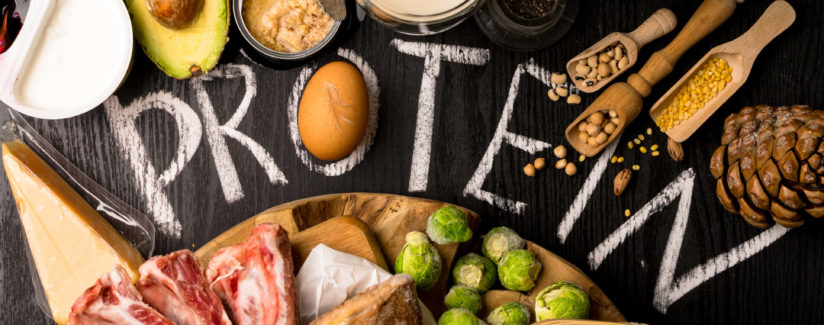
How Much Protein Do I Need Every Day?
03/29/2024
Protein – we’re told that we need it to build muscle, provide energy and fill our stomachs. But how much do we need each day? What role does protein really play in our diets? We reached out to Gordon Zello, Ph.D., professor of Nutrition and Dietetics at the University of Saskatchewan, to get answers to our many protein questions.
What is protein?
Dr. Zello: “Proteins are composed of amino acids. These amino acids are placed in a precise order by a genetic code specific to each protein. This makes each protein unique and related to its function in the body. All animals and plants contain protein; therefore, one source of amino acids comes from our diet.
“There are two kinds of amino acids, those that our body can make from other amino acids (dispensable or non-essential) and those that have to come from the food we eat (indispensable or essential). Protein is a macronutrient, along with carbohydrates and fat, thus besides its many functions it also provides energy to the body. Furthermore, protein is our source of nitrogen that we also require to make essential nitrogen-containing compounds.”
Protein has many functions in the body:
- Immediate energy (calories)
- Enzymes
- Hormones (e.g. insulin)
- Structural proteins (e.g. muscle, bone, teeth, skin, blood vessels, hair; nails etc.)
- Immunoproteins (e.g. antibodies)
- Transport proteins (e.g. albumin, hemoglobin, lipoproteins).
- Other essential nitrogen-containing compounds made from amino acids are melanin pigments (skin color) thyroid hormones, neurotransmitters (e.g. serotonin, epinephrine), nucleic acids and creatine.
How much protein does a person need in a day?
Dr. Zello: “The amount of protein an adult needs in a day is based on the weight of an individual, as the more you weigh the more protein one will require. For an adult, the requirement is 0.8 grams per kilogram of weight per day. Therefore, someone who weighs 70kg (155lbs) will require 56g of protein per day. It is usually not a problem to consume this much protein as most adults eat on average 80 to 120g of protein per day. If you are a growing infant or child, or a woman who is pregnant or nursing, your protein needs increase.”
What are some sources of protein?
Dr. Zello: “All plants and animal products contain protein. Those proteins that provide all the amino acids that we need are called high or good-quality proteins. These would include meats, eggs and dairy products. Some proteins have lower quality as they may be missing or have lower amounts of a specific amino acid. For example, legumes are lower in methionine and grains are lower in lysine. This is not usually a problem as we usually eat more protein than we need in a day.”
Are there different types of protein that help with athletic performance?
Dr. Zello: “Athletes do not require any different types of proteins as when we eat protein, the protein is broken down to amino acids in our digestive tract to amino acids that are then absorbed in our body. These absorbed amino acids are then to make proteins and as long as you eat balanced meals you will be getting sufficient amounts of amino acids to meet your needs including those of an athlete. As proteins are not stored in our body like fat, the protein that we eat in excess of what we need is broken down and the nitrogen excreted from our bodies.”
Is there anything else you would like to add?
Dr. Zello: “One misconception is that athletes are required to supplement their diet with protein as they are not consuming enough through the food they eat. Part of this misunderstanding is that protein requirements for an athlete may range between 1.2 to 1.7 g/kg per day which is greater than the 0.8 g/kg per day for the non-athlete. However, since we eat more protein than we need to begin with and an athlete will need to eat more calories to perform (expend more calories), the requirement for an athlete will still be met. For example, if an athlete weighing 60kg (132 pounds) consumes 15% of daily calories as protein (rest from carbohydrates and fats), and requires 2,700 kcal per day for energy needs, they would be at 1.7 g/kg per day, or the high end of an athlete’s protein needs.”
Protein is an important part of our daily diets and essential for our bodies to function. Animal sources of protein include meat, milk and eggs. Plant sources of protein include soy, peanuts, lentils and chick peas. Both plant and animal protein can be part of a healthy diet.
Originally published March 29, 2019.


























